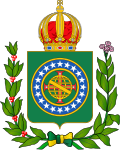| This article needs additional citations for verification. Please help improve this article by adding citations to reliable sources. Unsourced material may be challenged and removed. Find sources: "Felisberto Caldeira Brant, Marquis of Barbacena" – news · newspapers · books · scholar · JSTOR (March 2012) (Learn how and when to remove this message) |
You can help expand this article with text translated from the corresponding article in Portuguese. (July 2012) Click for important translation instructions.
|
| Marquis of Barbacena | |
|---|---|
 The Marquis of Barbacena, lithograph by S. A. Sisson The Marquis of Barbacena, lithograph by S. A. Sisson | |
| Minister of Finance | |
| In office 21 November 1825 – 20 January 1826 | |
| Monarch | Pedro I |
| Preceded by | Mariano Pereira da Fonseca |
| Succeeded by | Pereira da Cunha |
| In office 4 December 1829 – 2 October 1830 | |
| Preceded by | Miguel Calmon du Pin |
| Succeeded by | José Antônio Lisboa |
| Personal details | |
| Born | (1772-09-19)19 September 1772 Mariana, Minas Gerais, State of Brazil |
| Died | 13 June 1842(1842-06-13) (aged 69) Minas Gerais, Empire of Brazil |
| Spouse | Anna Constança Guilhermina de Castro Cardoso |
| Military service | |
| Allegiance | |
| Branch/service | |
| Battles/wars | Cisplatine War |
 Coat of Arms of the Marquis of Barbacena | |
Felisberto Caldeira Brant Pontes de Oliveira Horta, the Marquis of Barbacena (19 September 1772 – 13 June 1842) was a Brazilian soldier and statesman of both Portugal and the Empire of Brazil.
Life
Brant was born in Mariana, then the Portuguese Colony of Brazil, in 1772. He attended the Royal College of Nobles in Lisbon, eventually becoming an officer in the Portuguese army. Early in his career, Brant was sent to Angola, where he served as aide de camp to the royal governor there. In 1807, during the French invasion of Portugal, the Prince Regent, Dom João VI, fled to Brazil with a large retinue. Brant, who had by then returned to Portugal, accompanied the Prince Regent to South America. There, he became a pioneer in the field of steam transportation, developing such an interest in the method that he was granted official authorization to study it.
By 1821, the Prince Regent had returned to Portugal, leaving his son Dom Pedro I in control of Brazil. Relations between the two regions grew tense, and Brazil broke away from the kingdom. Brant supported Dom Pedro, now the Emperor, being sent on a diplomatic mission to London by José Bonifácio, the minister for both internal and foreign affairs. He met little success during his stay in England, and he returned to Brazil by 1826. During the Cisplatine War (1825-1828) with Argentina, Brant rose to become commander-in-chief of Brazilian forces. He commanded the Brazilian army during a failed invasion of Argentina, and was fought to a draw in the Battle of Ituzaingó. In 1829, Brant was charged with finding a bride for Dom Pedro. He succeeded in this mission, but fell from grace shortly afterward. He died in 1842.
References
- "Official biography" (in Portuguese). Ministry of Finance of Brazil. Archived from the original on 8 March 2013. Retrieved 25 April 2013.
- Aguiar 1896, p. 4.
- Gomes 2007, p. 190.
Bibliography
- Aguiar, Augusto Antonio de (1896). Vida do Marquez de Barbacena (in Portuguese). Rio de Janeiro: Imprensa Nacional.
- Gomes, Laurentino (2007). 1808: Como uma rainha louca, um príncipe medroso e uma corte corrupta enganaram Napoleão e mudaram a história de Portugal e do Brasil (in Portuguese). São Paulo: Editora Planeta do Brasil.
External links
| Empire of Brazil | |||||
|---|---|---|---|---|---|
| General topics |  | ||||
| Monarchy | |||||
| Politics |
| ||||
| Military |
| ||||
| Slavery |
| ||||
This biographical article related to the military of Brazil is a stub. You can help Misplaced Pages by expanding it. |
This biographical article about a member of the Brazilian nobility is a stub. You can help Misplaced Pages by expanding it. |